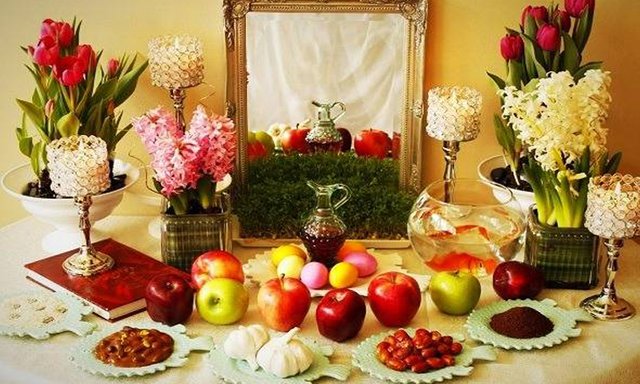✨ Persian New Year ✨
Hi.
How are you today?
I hope you are well.
I'm going to talk about Nowruz (Persian New Year), Be with me. 😊

In solar history, the first day of Farvardinis called the beginning of Nowruz. Nowruz begins with the sun passing through the equator and moving north to the sky. This moment of beginning is called the first moment of Aries. In the solar Hijri calendar, Nowruz is considered equal to the day of "Hormoz Rooz" or "Ormazd" in the month of Farvardin.
Nowruz is one of the best celebrations to celebrate the award since ancient times, since then, different Iranian tribes celebrate Nowruz every year with the new year.

According to the existing legends, Nowruz originated in the time of Jamshid, the fourth pre-Islamic king of Iran.
In Avesta, one of the oldest books of ancient Iran, a person named Jamshid is mentioned who had the power of Farah Izadi.
Jamshid begins to confront the devil by the order of Ahura Mazda, Because the devil had caused a lot of damage at that time, including famine and drought.
Famous poets and writers such as Abolghasem Ferdowsi, Abu Rihan Biruni and Tabari also consider Jamshid as the main founder of Nowruz.

Haft Seen




Haft-Seen also spelled as Haft Sīn is a tabletop (sofreh) arrangement of seven symbolic items traditionally displayed at Nowruz, the Persian new year.
The haft-seen table includes seven items all starting with the letter Seen (letter s) (fa) (س) in the Persian alphabet.
Sabzeh (سبزه) – wheat, barley, mung bean or lentil sprouts growing in a dish - symbolizing rebirth
Samanu (سمنو) – sweet pudding made from wheat germ – symbolizing affluence
Senjed (سنجد) – dried oleaster Wild Olive fruit – symbolizing love
Seer (سیر) – garlic – symbolizing the medicine and health
Seeb (سیب) – apple – symbolizing beauty
Somāq (سماق) – sumac fruit – symbolizing (the color of) sunrise
Serkeh (سرکه) – vinegar – symbolizing old-age and patience

The following items may also appear on the Haft-Seen table as ornaments or for the sake of completeness. Although some of these items are Persian symbols, they are not the main part of the traditional Haft-Seen.
The holy book
Divan-e Hafez, a Persian poetry book
a mirror
a goldfish in a bowl represents life and the end of astral year-picas (Goldfish is originally a symbol of Chinese new year)
a low brazier full of fire
a lamp
sprays of cypress or pine
pomegranates
painted eggs
coins as a symbol of wealth
candles for each member of the family
a bowl of waterwheat or bread

Another point I would like to say is that on Nowruz, the elders pay the younger ones. We call this "Eidi" 😊😉😉😊😊
This was our New Year tradition in Iran. If you have any special customs about your New Year, write to me. 🙌
انشالله سال جدید بدون کرونا
How interesting.
It was really good content.
your welcome. 😊